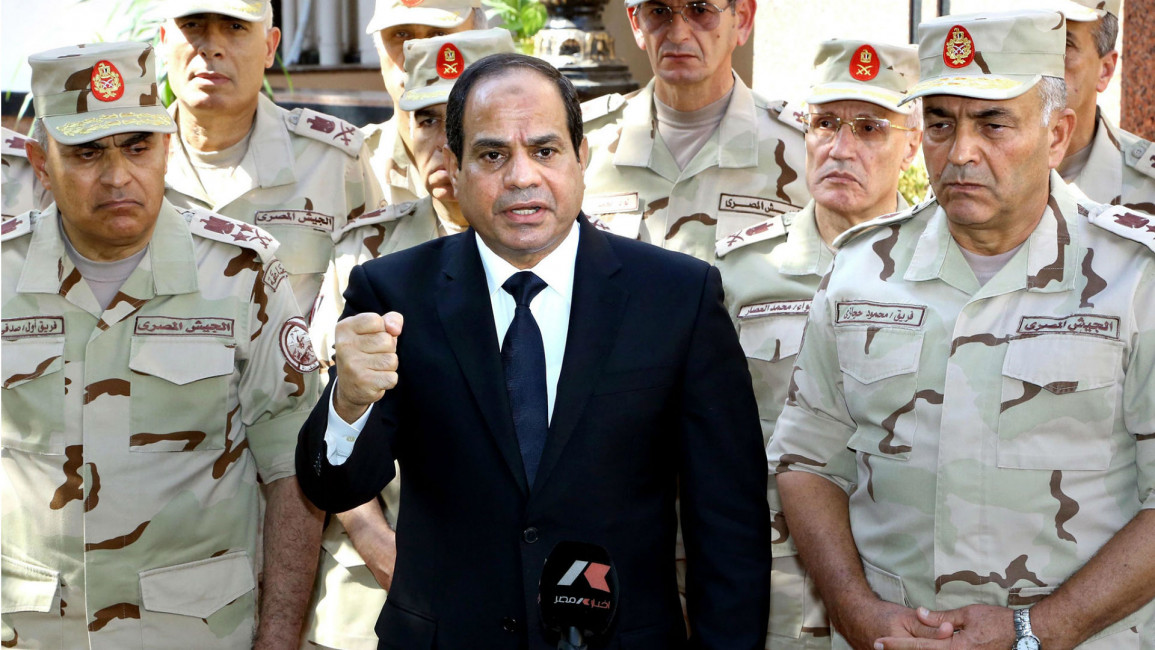Egypt's anti-terror law a new threat to press freedom
The draft law, which Egypt looks set to pass, will criminalise reporting statistics on militant attacks that contradict government statements such as the army, has been condemned by journalists.
The Supreme Judiciary Council approved most of the draft law, but objected to special terrorism courts for cases it said could be handled by criminal courts.
It also objected to a provision that required only lawyers and not their detained clients to be present for trials.
A government official said the law would be sent back to the cabinet which will make the suggested revisions, possibly on Monday.
But the government is not required to change one of the law's most controversial articles, which stipulates a minimum two-year sentence for anyone who reports casualty tolls from militant attacks that stray from government figures.
The law came partly in response to coverage of militant attacks on soldiers in Sinai on July 2.
| Highlights of new laws | |
|
- The president can now sign off on national security rulings without defendants being granted an appeal - 10-25 year sentences for individuals seeking to topple the regime or change the country’s constitution - 25 years up to the death penalty for anyone who starts, organizes, manages or leads a terrorist group - 5 year sentences to anyone convicted of using social media or the internet to promote ideas or beliefs leading to terrorist acts, impede state officials, or communicate with terrorist groups - The president has the right to impose a curfew, isolate or evict residents from an area should that area be exposed to an act of terror |
The military said 21 soldiers were killed in the attacks, after several media outlets reported higher tolls from security officials.
The official said condemnation of that provision by rights activists and the Egyptian Journalists Syndicate was "an overreaction" by the press.
"There are a lot of brakes" in the article, he said.
The article bans "intentionally reporting false information on terrorist attacks that contradicts official statements.
"The intent of the article necessitates that the false information is reported intentionally, with malice," said the official.
Gamal Eid, the executive director of the Arab Network for Human Rights Information (ANHRI), told the Guardian, “We are faced with an article that pushes the media towards Goebbels’ media – the media of one opinion and one narrative,”
“It is against the freedom of press, especially press that is critical and professional,” he said.
The Independent’s Cairo correspondent Ruth Michaelson tweeted, “As per Egypt's new counterterrorism draft law, State Info Service just contacted me to ask me to change my reported numbers of dead soldiers in Sinai.”
The country has been fighting a jihadist insurgency in Sinai since the army, then led by President Abd al- Fattah al-Sisi, overthrew Islamist president Mohamed Morsi in 2013.
The attacks have killed hundreds of policemen and soldiers, while more than 1,400 people, mostly Morsi supporters, have been killed in a crackdown on protests.
Egypt is currently holding the highest number of journalists behind bars since record keeping began, with most accused of affiliation with Morsi, the recently Committee to Protect Journalists reported.
Last week leading Spanish reporter was forced to leave Egypt suddenly, following urgent advice from Madrid that local authorities were preparing to arrest him.

![Trump's warm greeting to Netanyahu contrasted with Kamala Harris's critical reception [Getty]](/sites/default/files/styles/image_330x185/public/2024-07/GettyImages-2162908988.jpg?h=69f2b9d0&itok=OLc5dL88)
![The brutal assault on Khan Younis has killed dozens and displaced thousands more [Getty]](/sites/default/files/styles/image_212x120/public/2024-07/GettyImages-2162526709.jpg?h=d3eda8cf&itok=HCP84AvQ)
![Members of the Algerian delegation threw roses into the Seine [Getty]](/sites/default/files/styles/image_212x120/public/2024-07/GettyImages-2162980872.jpg?h=199d8c1f&itok=PDhNyMBE)